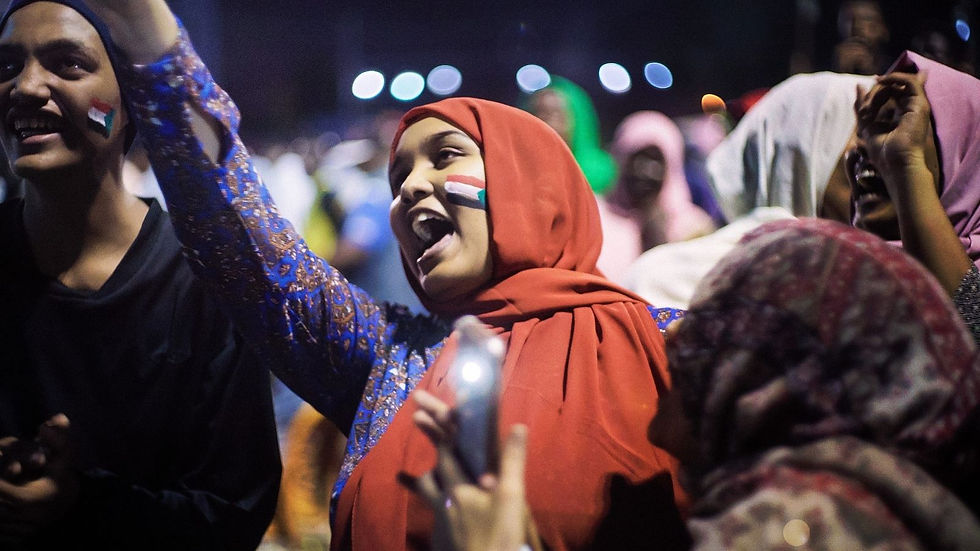'Sudan, Remember Us' Review: A Vivid Tapestry of Hope, Resistance, and Survival
- Romey Norton

- Aug 3, 2025
- 3 min read

By Romey Norton - August 3, 2025
In an era awash with fast-cut news clips and fleeting attention spans, Sudan, Remember Us stands as a vital corrective: a documentary that demands, and deserves, our full attention. Directed with measured intimacy and force by Hind Meddeb, this powerful new release from Watermelon Pictures arrives in theatres August 8, fresh off its win of the prestigious Tim Hetherington Award at Sheffield DocFest. It’s a searing, humane portrait of a revolution remembered not through headlines, but through the eyes, voices, and verses of those who lived, and continue to fight it.
What is 'Sudan, Remember Us' about?
Over four years, the film follows a core group of young activists from the vibrant, defiant sit-ins of 2019 to the shadows of today’s civil war. It follows how they peacefully protest the oppressive regime and shows a strength and resilience that should inspire everyone around the world.
Their dreams, defeats, and creative resistance are captured with a rare combination of urgency and tenderness. The tone is never despairing, even as the revolution unravels; instead, there’s a palpable reverence for the resilience and artistry of Sudan’s youth. Streets filled with music, art poetry; all the artistic ways we can express ourselves.
Is 'Sudan, Remember Us' based on real life?
Yes. The documentary opens with chilling footage from a mobile phone of a fighter jet firing bombs and ground vehicles fighting back. Then a chilling but beautiful pan of murals of faces across a large wall, with one piece stating “we will not forgive or forget” - it’s quietly powerful.
It’s not just about what happened in Sudan; it’s about how people remember, how they resist, and how art keeps them whole. For audiences unfamiliar with Sudan’s recent history, this documentary becomes more than just educational; it becomes emotional.
One of the film’s most stirring achievements is how it reframes protest not just as a political act but as an act of cultural preservation. Spoken-word poetry and traditional Sudanese verse are woven seamlessly into the narrative, becoming both commentary and lifeline. Murals, chants, and impromptu concerts all become expressions of a people who refuse to be silenced. “The people demand justice for the dead!” on a banner is an example of many powerful statements throughout the documentary.
The use of raw footage is anything but lacking. The cinematography feels embedded, never intrusive, with a warmth that balances the weight of the material. Interviews are intimate, the conversations unfiltered and the shots aren’t edited with anything fancy like animations. It’s real and raw. There are shots of people being arrested, beaten and of debris and devastation across the streets, which are hard to see.

If there’s a critique to be made, it’s only that the scope is so wide and the subject so vast, some viewers may feel they needed more information in backstory to appreciate what is happening. But Meddeb seems less interested in creating a definitive historical account than in capturing an emotional truth, and on that front, she succeeds powerfully.
Is 'Sudan, Remember Us' worth watching?
Yes. This poignant, powerful piece of film insists on the humanity of its subjects and asks Western audiences to listen without filters. With civil war still raging, and global attention turned elsewhere, the film is a crucial reminder: revolutions may vanish from the news cycle, but their stories, and the people who lived them, deserve to be remembered.
Sudan, Remember Us is a profound and necessary film; one that speaks softly but leaves a thunderous echo. If you're seeking documentaries about revolution, African political history, or simply stories of resilience told with beauty and care, this is unmissable cinema.
'Sudan, Remember Us' arrives in cinemas August 8

Love powerful documentaries and global stories? Explore more insightful film reviews at Film Focus Online and stay connected with the best in contemporary world cinema.











